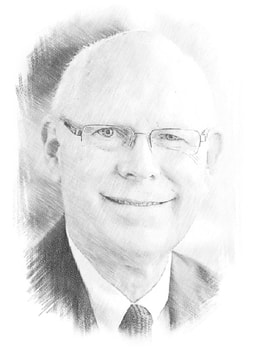- Walter Bartel - Emmanuel Baruwa - Megan Basham - Diana Butler Bass - Nick Batzig - Gary Bauer - Paul Baxter - Greg Beale - Katelyn Beaty - David Bebbington - David Beckmann - Michael Behe- Peter J Belini - John Benefiel -
==walter bartel======
Walter Bartel is pastor of Calvary Baptist Church of Treherne in Canada.
 Walter Bartel Files
Walter Bartel Files
The Psalms have many references to the mercy of the LORD. He is merciful all the time. In (Zechariah 1:13) verse 13 the LORD not only demonstrated His mercy but also His longsuffering. He was willing to answer the angel with good words and comfortable words. God’s Words are good and they are comfortable to those who walk humbly with Him. The ungodly will not find comfort in God’s Word, because they do not understand true comfort, nor do they understand the way of having comfort. The world looks at material things as the means of comfort. The child of God seeks truth and needs to be taught that comfort comes through truth and through submission to the truth. Comfort of heart is essential. Without that, the “comforts of the world” are very temporal. Those who seek comfort from the LORD will find that it is of greater substance than material things. -Walter Bartel; Sermon Audio; The Importance of Seeking God’s Answer 10.15.13
==emmanuel baruwa======
[ICYMI] Why I stopped tithe, offering payment in my church — Pastor
My name is Prophet Dr Emmanuel Baruwa (JP) popularly known as Baba Talitakumi. I’m the pastor at the INRI Evangelical Spiritual Church Talitakumi model parish based in Ijoko Otta, Ogun State. I have some reasons for taking the decision. First, during the time immediate period after the fuel subsidy was removed, many people could not come to church because they did not have money. Also, with the situation in the country right now with the cost of foodstuffs, it became clear to me that people are suffering. Food is now expensive. Let’s forget about me, I think all of us should put ourselves in the position of these church members. If we put ourselves in the position of a church member, we will know the problems a lot of them are facing. When somebody is coming from a far place to worship at the church, and he is to spend N2,000 on transportation. And that person has just N3,000 and will still want to pay the Church offering from that money, How will he survive? If I stop the offering, it doesn’t mean I will not eat. If I stop the tithes, it doesn’t mean God will not send a helper to me. So, I have to be considerate. Many people believe the Bible says we should pay for offerings in Church, and it is when we pay for offerings that God will bless us. But when somebody doesn’t have the money to pay the offering, is God not going to bless that person?, of course, God will bless the person.
(Punch 6/9/24) Read More>>>>>
My name is Prophet Dr Emmanuel Baruwa (JP) popularly known as Baba Talitakumi. I’m the pastor at the INRI Evangelical Spiritual Church Talitakumi model parish based in Ijoko Otta, Ogun State. I have some reasons for taking the decision. First, during the time immediate period after the fuel subsidy was removed, many people could not come to church because they did not have money. Also, with the situation in the country right now with the cost of foodstuffs, it became clear to me that people are suffering. Food is now expensive. Let’s forget about me, I think all of us should put ourselves in the position of these church members. If we put ourselves in the position of a church member, we will know the problems a lot of them are facing. When somebody is coming from a far place to worship at the church, and he is to spend N2,000 on transportation. And that person has just N3,000 and will still want to pay the Church offering from that money, How will he survive? If I stop the offering, it doesn’t mean I will not eat. If I stop the tithes, it doesn’t mean God will not send a helper to me. So, I have to be considerate. Many people believe the Bible says we should pay for offerings in Church, and it is when we pay for offerings that God will bless us. But when somebody doesn’t have the money to pay the offering, is God not going to bless that person?, of course, God will bless the person.
(Punch 6/9/24) Read More>>>>>
==megan basham======
Al Mohler stirs debate on abortion abolition, whether women should be prosecuted
Megan Basham, an author and reporter with The Daily Wire, tweeted a dissent to Prior’s rebuttal, labeling it the “typical evangelical establishment word salad attempting obfuscate the fact that women know when they are perpetrating an evil act, such as killing their children.” “You cannot advocate for women as moral equals of men and then say they’re unable to know what they do because of the ‘social imaginary,’” Basham argued. (Christian Post 3/28/24) READ MORE>>>>>
Megan Basham, an author and reporter with The Daily Wire, tweeted a dissent to Prior’s rebuttal, labeling it the “typical evangelical establishment word salad attempting obfuscate the fact that women know when they are perpetrating an evil act, such as killing their children.” “You cannot advocate for women as moral equals of men and then say they’re unable to know what they do because of the ‘social imaginary,’” Basham argued. (Christian Post 3/28/24) READ MORE>>>>>
==diana butler bass======
A GREAT EVANGELICAL DIVORCE? — SPEAKER MIKE JOHNSON’S BREAKUP WITH MARJORIE TAYLOR GREENE COULD BE BAD NEWS FOR TRUMP
When Speaker of the House Mike Johnson pushed through aid to Ukraine this week, it did more than green-light funds to support the Ukrainians. In recent weeks, he changed from hard-core opposition to supporting Ukraine to championing its cause. His actions were, of course, political and personal, but they also signal a genuine conflict within American evangelicalism, one that could have ramifications for the upcoming presidential elections. At the beginning of 2024, mention of a report on Russian persecution of Ukrainian Christians started showing up in some evangelical publications, mostly notably in a February 6 story in Christianity Today. The report, “Faith Under Fire: Navigating Religious Freedom Amidst the War in Ukraine,” was published in November 2023 by Mission Eurasia (an evangelical mission agency founded when the Soviet Union collapsed) outlining church closures; destruction of church buildings; kidnappings; imprisonment and torture of religious leaders; and the murder of priests and pastors.
(Diana Butler Bass/Religion Dispatches 5/23/24) Read More>>>>>
When Speaker of the House Mike Johnson pushed through aid to Ukraine this week, it did more than green-light funds to support the Ukrainians. In recent weeks, he changed from hard-core opposition to supporting Ukraine to championing its cause. His actions were, of course, political and personal, but they also signal a genuine conflict within American evangelicalism, one that could have ramifications for the upcoming presidential elections. At the beginning of 2024, mention of a report on Russian persecution of Ukrainian Christians started showing up in some evangelical publications, mostly notably in a February 6 story in Christianity Today. The report, “Faith Under Fire: Navigating Religious Freedom Amidst the War in Ukraine,” was published in November 2023 by Mission Eurasia (an evangelical mission agency founded when the Soviet Union collapsed) outlining church closures; destruction of church buildings; kidnappings; imprisonment and torture of religious leaders; and the murder of priests and pastors.
(Diana Butler Bass/Religion Dispatches 5/23/24) Read More>>>>>
 Diana Butler Bass
Diana Butler Bass
“First, it provides Jesus’s legal pedigree. He is the son of David, in Israel’s royal line ... But Matthew has a second purpose. His genealogy tells readers that Jesus’s ancestry is the human story of faith and faithlessness, of good deeds and wicked ones, of saintly actions and dubious intentions ... In other words, Jesus may be a ‘king’ in the royal line of David, but his family is pretty much the same as everyone else’s. Matthew puts it out there — Jesus, son of Joseph, has a family genogram that could keep a therapist occupied for years.” --Diana Butler Bass
==nick batzig======
 Nick Batzig
Nick Batzig
Pride is the greatest snare in the souls of men. It is essentially a measuring of ourselves by ourselves and a comparing of ourselves among ourselves (2 Cor. 10:12). When we allow pride to fester and take root in our hearts, we begin to think, act and speak as if we are, because of our supposed virtues, spiritually superior to others. As we do so, we make that in which he believe we excel our standard of holiness, rather than God’s Law with its unattainable depths and requirements. Additionally, when we foster spiritual pride we reveal that we do not truly see our need the atoning sacrifice of Christ for our sin. -Nick Batzig; Feeding On Christ; The Nature and Marks of Spiritual Pride 7.26.23
==gary bauer======
 Steve Rabey
Steve Rabey
Family Research Council has praised Tuberville’s courage in a series of fundraising emails, hailing his “David vs. Goliath standoff with the Biden administration’s Department of Defense and even fellow senators in order to protect unborn lives and the rule of law. … For months he has courageously stood firm. …What if every Bible-believing Christian in America took seriously the calling of Jesus for each of us to be salt and light in the darkening world around us?”
Family Research Council also claimed the Defense Department is acting in bad faith: “Let’s be absolutely clear: The Pentagon’s new abortion policy has everything to do with activist politics and nothing to do with Congress’ obligation to raise and maintain armed forces to provide for the common defense.” ..Gary Bauer of the James Dobson Family Institute said the military has gone “woke” in promoting “abortion, transgender ideology and Critical Race Theory / anti-American history.” He claimed this shift is hurting recruitment because “millions of American families will not encourage their sons and daughters to serve in such a military.” Focus on the Family’s Daily Citizen also praised Tuberville: “In Washington, D.C., it’s rare for politicians to follow through on commitments they’ve made. But so far, Sen. Tuberville has done exactly that.” --Steve Rabey; Baptist News Global; Christian groups applaud Tommy Tuberville’s blockade of military promotions 9.8.23
Family Research Council also claimed the Defense Department is acting in bad faith: “Let’s be absolutely clear: The Pentagon’s new abortion policy has everything to do with activist politics and nothing to do with Congress’ obligation to raise and maintain armed forces to provide for the common defense.” ..Gary Bauer of the James Dobson Family Institute said the military has gone “woke” in promoting “abortion, transgender ideology and Critical Race Theory / anti-American history.” He claimed this shift is hurting recruitment because “millions of American families will not encourage their sons and daughters to serve in such a military.” Focus on the Family’s Daily Citizen also praised Tuberville: “In Washington, D.C., it’s rare for politicians to follow through on commitments they’ve made. But so far, Sen. Tuberville has done exactly that.” --Steve Rabey; Baptist News Global; Christian groups applaud Tommy Tuberville’s blockade of military promotions 9.8.23
==paul baxter======
 Paul Baxter
Paul Baxter
We read how Elisha, the prophet of God, was entering one of the worst places in the corrupt and decadent nation of Israel. Although Bethel was called “the House of God,” what should have been a holy place was a center of idolatry and immorality where the “sons of God” were vastly outnumbered by those who taunted and trashed the faith of Elijah and Elisha! Bethel was so bad that a gang of young teenagers “harassed” Elisha, taunting him to leave them and their town alone and go off to be with his God (as Elijah had done).
Gleason Archer puts everything in perspective when he describes this large roving band of teenagers as “a serious public danger, quite as grave as the large youth gangs that roam the ghetto sections of our modern American cities.” The Apologetics Study Bible explains: “The Hebrew phrase for ‘small boys’ refers to adolescents from 12 to 30 years old (see I Samuel 20:35; I Kings 3:7; 11:17). It is unlikely that these youths were younger than 12 years old.” Contrary to the caricature, Elisha was a young man, probably in his mid twenties, though obviously bald.
We are also reminded that the real issue was not how this gang showed contempt and “disrespect for God’s prophet,” but revealed utter “disrespect for the Lord.” Therefore, “a strong message was sent to the city and parents” reminiscent of Leviticus 26:21-22. This Scripture tells how hostility toward God and an unwillingness to obey Him can result in being besieged by plagues and wild animals.
The message was a corrective message to address current attitudes and behavior that if heeded would ward off worse sins and greater judgment. The gang was shocked and silenced when mauled (not necessarily killed) by the bears, and their parents and community were warned to repent of their sins (reflected in their children) and obey God before worse judgments befell them!
Walter C. Kaiser writes how the eventual fall of Israel “would have been avoided had the people repented after the bear attack.” They did not.
According to II Chronicles 36:16 we read how “they kept ridiculing God’s messengers, despising His words, and scoffing at His prophets … As Kaiser wisely states: The “bear attack shows God trying repeatedly to bring his people back to himself through smaller judgments” so that they could avoid a worse “full force” judgment.
--Paul Baxter; The Christian Index; Why would God send a bear to maul children? 2/4/22
Gleason Archer puts everything in perspective when he describes this large roving band of teenagers as “a serious public danger, quite as grave as the large youth gangs that roam the ghetto sections of our modern American cities.” The Apologetics Study Bible explains: “The Hebrew phrase for ‘small boys’ refers to adolescents from 12 to 30 years old (see I Samuel 20:35; I Kings 3:7; 11:17). It is unlikely that these youths were younger than 12 years old.” Contrary to the caricature, Elisha was a young man, probably in his mid twenties, though obviously bald.
We are also reminded that the real issue was not how this gang showed contempt and “disrespect for God’s prophet,” but revealed utter “disrespect for the Lord.” Therefore, “a strong message was sent to the city and parents” reminiscent of Leviticus 26:21-22. This Scripture tells how hostility toward God and an unwillingness to obey Him can result in being besieged by plagues and wild animals.
The message was a corrective message to address current attitudes and behavior that if heeded would ward off worse sins and greater judgment. The gang was shocked and silenced when mauled (not necessarily killed) by the bears, and their parents and community were warned to repent of their sins (reflected in their children) and obey God before worse judgments befell them!
Walter C. Kaiser writes how the eventual fall of Israel “would have been avoided had the people repented after the bear attack.” They did not.
According to II Chronicles 36:16 we read how “they kept ridiculing God’s messengers, despising His words, and scoffing at His prophets … As Kaiser wisely states: The “bear attack shows God trying repeatedly to bring his people back to himself through smaller judgments” so that they could avoid a worse “full force” judgment.
--Paul Baxter; The Christian Index; Why would God send a bear to maul children? 2/4/22
==greg Beale======
 Greg Beale
Greg Beale
Peter Enns begins his new blog series with his own story about what caused his view of the Bible to change. One of the “culminating ‘aha’ moments” came from his study of 1 Cor 10:4: “for they drank from the spiritual rock that accompanied them, and that rock was Christ.”
Paul is clearly referring back to the times when God refreshed the Israelites with water from a rock during their desert wanderings (Exodus 17, Numbers 20). However, Enns argues that Paul is doing more than just referring to the Old Testament accounts. Paul describes the rock as something which “accompanied them”—a clear reference, according to Enns, to ancient Jewish tradition that the rock in the desert actually travelled along with the Israelites.
Since the Jewish tradition about a travelling rock is clearly a legend—a legend that Paul apparently took to be fact—then we have a real problem, says Enns, for the evangelical view of biblical authority. He puts it bluntly, “no rock moved in the Old Testament, but Paul said one did.”
Of course, I have already responded to Enns’ argument in prior works (e.g., see my Erosion of Inerrancy in Evangelicalism, chapters 4 and 5). But, I shall try to summarize some of those earlier points here, but the fuller discussion should be consulted, which also interacts with Enns’s responses to my critiques.
The problem with Enns’ argument is twofold: (a) there are doubts about whether this Jewish “tradition” of a moveable rock was present in the first century; and (b) even if the tradition was present, there are doubts about whether Paul was alluding to it.
As to the first problem, there is only one Jewish reference to this “tradition” that plausibly is dated around the first century A.D., but even part of this reference is clouded by textual uncertainty. The lone Jewish source is Pseudo-Philo, which is dated by the majority of scholars as early as the first century A.D., though there is some debate even about that. The main text in Pseudo-Philo is 11:15: “and the water of Marah became sweet. And it [the well or the water] followed them in the wilderness forty years and went up to the mountain with them and went down into the plains.” However, while some very good manuscripts (the ∆- group of mss. [A, K, P]) have “it followed,” the majority of manuscripts (the π – group of mss. [H, R, W, X, Y, Z, S, Ad, D, E, V, M, B, C, O, G]), which are also manuscripts of very good, indeed almost equal, authority with the ∆- group of manuscripts, have “the Lord [Dominus] followed.”
If “Lord” is the correct reading, then the identification of the “following well” in Pseudo-Philo 10:7 (as well as, presumably, in 20:8) would apparently be the Lord himself. Put another way, if “Lord” is original, then the “following well” in 10:7 and the “water” in the preceding clause of 11:15 could well be viewed as metaphorical for the “Lord” in 11:15, which would take the legendary punch out of the evidence.
The point is that this is not a minor textual problem, despite one’s final conclusions about it, and to base a major conclusion in 1 Cor. 10:4 on this Pseudo-Philo text is precarious. This leaves only Tosephta Sukka 3.11 (date ca. 300 A.D.) and Targum Onquelos Numbers 21:16-20 (date ca. 250-300 A.D.). These are the only really solid textual witnesses to the kind of Jewish legend that Enns says Paul was dependent on; however, because of their late date, it is difficult to say that the legendary tradition was even extant in the first century.
As for the second problem, even if this Jewish “tradition” was extant in the first century there are serious doubts about whether 1 Cor 10:4 demonstrates Paul’s adoption of it. He may well be doing a biblical – theological exegesis of Exodus 14-17 in the light of Psalm 78:14-20 (e,g., “he splits the rocks . . . and gave them abundant drink . . . he struck the rock so that waters gushed out”) and 78:35 (“God was their rock”), the latter of which appears to identify God with the “rock” of Ps. 78:15-16, 20.
Note also some of the differences between Paul’s reference and that of later Judaism: (1) he identifies the rock as the Messiah, (2) he does not use the language of a “well” and (3) he refers to the “rock” from which they drank as a “spiritual rock” from which “spiritual drink” was obtained (1 Cor. 10:4), not a literal rock, significant differences with the later Jewish legend, which appears to see a literal traveling well that “followed” Israel. Incidentally, note also that the idea of God in association with a “rock” that “followed” Israel in the wilderness is not unique to the later Jewish midrashic literature but occurs also in Exod. 14:19 in relation to Exod. 17:5-7, where in the latter passage the presence of the rock from which drinking water came may also implicitly suggest that God is a rock or at least is directly linked to the phrase “the Lord is among us” in response to the people’s doubt about this.
In this respect, note the “following” concept in Exod. 14:19: “and the angel of God who had been walking before the camp of Israel, moved and walked behind them; and the pillar of cloud moved from before them and stood behind them.” And the presence of God continues to move between the Egyptians and the Israelites as the latter go through the sea. Note similarly that Isa. 52:12 and 58:8 allude to Exod. 14:19 and prophesy that in the new, second Exodus God would also be Israel’s “rear guard.” Thus, in light of the fact that Exod. 17:6 very closely associates God with the “rock” (as does Psalm 78), it does not take much ingenuity to see how Paul could posit that Christ was a “following rock” in his pre-incarnate divine existence as the “angel of the Lord.” Paul may be doing intratextual and intertextual exegesis, which is a form of biblical theology. Thus, Enns’s attempt to say that the “following” aspect is unique to the Jewish well legend is not correct, since both linguistically and conceptually the notion occurs in the Old Testament itself.
In sum, we can conclude that Enns’ primary conclusions about 1 Cor 10:4 simply remain unproven. It is not certain that this Jewish tradition was even extant in the first century, nor is it certain (if it was extant) that Paul was alluding to it or adopting it.
--Greg Beale; Cannon Fodder: Does the Bible Ever Get it Wrong? Facing Scripture’s Difficult Passages (#1): 8.25.14
Paul is clearly referring back to the times when God refreshed the Israelites with water from a rock during their desert wanderings (Exodus 17, Numbers 20). However, Enns argues that Paul is doing more than just referring to the Old Testament accounts. Paul describes the rock as something which “accompanied them”—a clear reference, according to Enns, to ancient Jewish tradition that the rock in the desert actually travelled along with the Israelites.
Since the Jewish tradition about a travelling rock is clearly a legend—a legend that Paul apparently took to be fact—then we have a real problem, says Enns, for the evangelical view of biblical authority. He puts it bluntly, “no rock moved in the Old Testament, but Paul said one did.”
Of course, I have already responded to Enns’ argument in prior works (e.g., see my Erosion of Inerrancy in Evangelicalism, chapters 4 and 5). But, I shall try to summarize some of those earlier points here, but the fuller discussion should be consulted, which also interacts with Enns’s responses to my critiques.
The problem with Enns’ argument is twofold: (a) there are doubts about whether this Jewish “tradition” of a moveable rock was present in the first century; and (b) even if the tradition was present, there are doubts about whether Paul was alluding to it.
As to the first problem, there is only one Jewish reference to this “tradition” that plausibly is dated around the first century A.D., but even part of this reference is clouded by textual uncertainty. The lone Jewish source is Pseudo-Philo, which is dated by the majority of scholars as early as the first century A.D., though there is some debate even about that. The main text in Pseudo-Philo is 11:15: “and the water of Marah became sweet. And it [the well or the water] followed them in the wilderness forty years and went up to the mountain with them and went down into the plains.” However, while some very good manuscripts (the ∆- group of mss. [A, K, P]) have “it followed,” the majority of manuscripts (the π – group of mss. [H, R, W, X, Y, Z, S, Ad, D, E, V, M, B, C, O, G]), which are also manuscripts of very good, indeed almost equal, authority with the ∆- group of manuscripts, have “the Lord [Dominus] followed.”
If “Lord” is the correct reading, then the identification of the “following well” in Pseudo-Philo 10:7 (as well as, presumably, in 20:8) would apparently be the Lord himself. Put another way, if “Lord” is original, then the “following well” in 10:7 and the “water” in the preceding clause of 11:15 could well be viewed as metaphorical for the “Lord” in 11:15, which would take the legendary punch out of the evidence.
The point is that this is not a minor textual problem, despite one’s final conclusions about it, and to base a major conclusion in 1 Cor. 10:4 on this Pseudo-Philo text is precarious. This leaves only Tosephta Sukka 3.11 (date ca. 300 A.D.) and Targum Onquelos Numbers 21:16-20 (date ca. 250-300 A.D.). These are the only really solid textual witnesses to the kind of Jewish legend that Enns says Paul was dependent on; however, because of their late date, it is difficult to say that the legendary tradition was even extant in the first century.
As for the second problem, even if this Jewish “tradition” was extant in the first century there are serious doubts about whether 1 Cor 10:4 demonstrates Paul’s adoption of it. He may well be doing a biblical – theological exegesis of Exodus 14-17 in the light of Psalm 78:14-20 (e,g., “he splits the rocks . . . and gave them abundant drink . . . he struck the rock so that waters gushed out”) and 78:35 (“God was their rock”), the latter of which appears to identify God with the “rock” of Ps. 78:15-16, 20.
Note also some of the differences between Paul’s reference and that of later Judaism: (1) he identifies the rock as the Messiah, (2) he does not use the language of a “well” and (3) he refers to the “rock” from which they drank as a “spiritual rock” from which “spiritual drink” was obtained (1 Cor. 10:4), not a literal rock, significant differences with the later Jewish legend, which appears to see a literal traveling well that “followed” Israel. Incidentally, note also that the idea of God in association with a “rock” that “followed” Israel in the wilderness is not unique to the later Jewish midrashic literature but occurs also in Exod. 14:19 in relation to Exod. 17:5-7, where in the latter passage the presence of the rock from which drinking water came may also implicitly suggest that God is a rock or at least is directly linked to the phrase “the Lord is among us” in response to the people’s doubt about this.
In this respect, note the “following” concept in Exod. 14:19: “and the angel of God who had been walking before the camp of Israel, moved and walked behind them; and the pillar of cloud moved from before them and stood behind them.” And the presence of God continues to move between the Egyptians and the Israelites as the latter go through the sea. Note similarly that Isa. 52:12 and 58:8 allude to Exod. 14:19 and prophesy that in the new, second Exodus God would also be Israel’s “rear guard.” Thus, in light of the fact that Exod. 17:6 very closely associates God with the “rock” (as does Psalm 78), it does not take much ingenuity to see how Paul could posit that Christ was a “following rock” in his pre-incarnate divine existence as the “angel of the Lord.” Paul may be doing intratextual and intertextual exegesis, which is a form of biblical theology. Thus, Enns’s attempt to say that the “following” aspect is unique to the Jewish well legend is not correct, since both linguistically and conceptually the notion occurs in the Old Testament itself.
In sum, we can conclude that Enns’ primary conclusions about 1 Cor 10:4 simply remain unproven. It is not certain that this Jewish tradition was even extant in the first century, nor is it certain (if it was extant) that Paul was alluding to it or adopting it.
--Greg Beale; Cannon Fodder: Does the Bible Ever Get it Wrong? Facing Scripture’s Difficult Passages (#1): 8.25.14
==katelyn beaty======

Katelyn Beaty is a writer, journalist, editor, and keen observer of trends in the American church. She has written for the New York Times, the New Yorker, the Washington Post, Religion News Service, Religion & Politics, and the Atlantic and has commented on faith and culture for CNN, ABC, NPR, the Associated Press, and the Canadian Broadcasting Corporation. She also cohosts the Saved by the City podcast (Religion News Service). Beaty previously served as print managing editor at Christianity Today and is the author of A Woman's Place: A Christian Vision for Your Calling in the Office, the Home, and the World.
|
April 12, 2023: Katelyn Beaty: The Roys Report: Opinion: It’s Unloving to Quickly Restore Fallen Pastors
|
david bebbingtom
David William Bebbington (born 25 July 1949) is a British historian who is a professor of history at the University of Stirling in Scotland and a distinguished visiting professor of history at Baylor University. He is a Fellow of the Royal Society of Edinburgh and the Royal Historical Society. Bebbington was born in Nottingham, England, on 25 July 1949 and was raised in Sherwood, a northern suburb of Nottingham. An undergraduate at Jesus College, Cambridge (1968–1971), Bebbington began his doctoral studies there (1971–1973) before becoming a research fellow of Fitzwilliam College (1973–1976). Since 1976 he has taught at the University of Stirling, where since 1999 he has been Professor of History. He was President of the Ecclesiastical History Society (2006–2007).
The Evangelical Imagination: How Stories, Images, and Metaphors Created a Culture in Crisis
American evangelicals have long been proficient at introspective assessments of our own movement. Since the mid-1980s, sociologists like James Davison Hunter have diagnosed evangelicalism’s contemporary virtues and pathologies, while thinkers like Mark Noll and David Bebbington have sought to interpret the movement through a historical lens. Such diagnoses have often taken on an urgent tone that, rather than undermining the movement, has been one of the keys to its endurance and vitality. In 1967, Carl Henry wrote Evangelicals at the Brink of Crisis, warning that evangelicals were in danger of being culturally marginalized. In 1976, he penned a similarly anxious missive, Evangelicals in Search of an Identity. If evangelicalism is anything at all, it is probably a movement preoccupied with such a search and with the social alienation that demands it.
(Matthew Lee Anderson/Public Discourse 11/13/23)
Read More>>>>>
American evangelicals have long been proficient at introspective assessments of our own movement. Since the mid-1980s, sociologists like James Davison Hunter have diagnosed evangelicalism’s contemporary virtues and pathologies, while thinkers like Mark Noll and David Bebbington have sought to interpret the movement through a historical lens. Such diagnoses have often taken on an urgent tone that, rather than undermining the movement, has been one of the keys to its endurance and vitality. In 1967, Carl Henry wrote Evangelicals at the Brink of Crisis, warning that evangelicals were in danger of being culturally marginalized. In 1976, he penned a similarly anxious missive, Evangelicals in Search of an Identity. If evangelicalism is anything at all, it is probably a movement preoccupied with such a search and with the social alienation that demands it.
(Matthew Lee Anderson/Public Discourse 11/13/23)
Read More>>>>>
david beckman
David Beckmann is coordinator of the Circle of Protection, an advocacy coalition of church bodies and ministries that include 100 million people. He is both an economist and a pastor.
We need to hear from the presidential candidates about poverty
(RNS) — In the run-up to Election Day in 2020, then-presidential candidate Joe Biden delivered a major address on strategies to reduce U.S. poverty. To his credit, that strategy was later reflected in his Build Back Better program, much of it passed in the first year of the Biden administration. Its pandemic relief and recovery measures, some of them approved on a bipartisan basis, provided needed assistance, kept unemployment low and reduced poverty in America to its lowest level in history. A diverse coalition of church leaders called the Circle of Protection, working with the Poor People’s Campaign, helped convince Biden to give that big speech about poverty. Starting with outreach to the Obama and Romney campaigns in 2012, the group had been working for years to get presidential candidates to explain how they would provide more opportunity to people struggling with poverty and hunger. Our simple ask has been for the candidates from the two major parties to make videos explaining their policies on poverty. In the 2016 and 2020 elections, nearly all candidates in both parties made videos. Donald Trump submitted a written statement in 2016.
(David Beckmann/ Religion News 11/24/23)
Read More>>>>>
(RNS) — In the run-up to Election Day in 2020, then-presidential candidate Joe Biden delivered a major address on strategies to reduce U.S. poverty. To his credit, that strategy was later reflected in his Build Back Better program, much of it passed in the first year of the Biden administration. Its pandemic relief and recovery measures, some of them approved on a bipartisan basis, provided needed assistance, kept unemployment low and reduced poverty in America to its lowest level in history. A diverse coalition of church leaders called the Circle of Protection, working with the Poor People’s Campaign, helped convince Biden to give that big speech about poverty. Starting with outreach to the Obama and Romney campaigns in 2012, the group had been working for years to get presidential candidates to explain how they would provide more opportunity to people struggling with poverty and hunger. Our simple ask has been for the candidates from the two major parties to make videos explaining their policies on poverty. In the 2016 and 2020 elections, nearly all candidates in both parties made videos. Donald Trump submitted a written statement in 2016.
(David Beckmann/ Religion News 11/24/23)
Read More>>>>>
michael behe

Michael J. Behe (born January 18, 1952) is an American biochemist, author, and intelligent design (ID) advocate. He currently serves as professor of biochemistry at Lehigh University in Pennsylvania and as a senior fellow of the Discovery Institute's Center for Science and Culture. Behe is best known for his argument for irreducible complexity (IC), which argues that some biochemical structures are too complex to be adequately explained by known evolutionary mechanisms and are therefore more probably the result of intelligent design. Behe has testified in several court cases related to intelligent design, including the court case Kitzmiller v. Dover Area School District that resulted in a ruling that intelligent design was religious in nature. Behe's claims about the irreducible complexity of essential cellular structures have been rejected by the vast majority of the scientific community, and his own biology department at Lehigh University published an official statement opposing Behe's views and intelligent design
Apr 25, 2023: Evolution News: Michael Behe, Stephen Meyer, John Lennox: The Evidence for Design Is Growing
On a new episode of ID the Future, Uncommon Knowledge’s Peter Robinson sits down with Michael Behe, John Lennox, and Stephen Meyer, three of the leading voices in science and academia on the case for an intelligent designer of life and the universe. In this wide-ranging conversation in Fiesole, Italy, they explore the growing problems with modern evolutionary theory and the increasing evidence, uncovered by a rigorous application of the scientific method, that points to intentional design of the physical world.
On a new episode of ID the Future, Uncommon Knowledge’s Peter Robinson sits down with Michael Behe, John Lennox, and Stephen Meyer, three of the leading voices in science and academia on the case for an intelligent designer of life and the universe. In this wide-ranging conversation in Fiesole, Italy, they explore the growing problems with modern evolutionary theory and the increasing evidence, uncovered by a rigorous application of the scientific method, that points to intentional design of the physical world.
Aug 30, 2021: Evolution News: How Engineers Helped Save Biology from Evolutionary Theory
Evolutionist Jerry Coyne emphasized in his hatchet-job review of Michael Behe’s Darwin Devolves how life should display similar bottom-up design:
Dec 19, 2014: Rational Skepticism: Behe declares victory on all fronts
In a talk in South Korea, Michael Behe has admitted doing a "victory dance" in his office based on new evidence that he claims supports his ID contentions: https://www.youtube.com/watch?v=YlvYn0WrHaY
Evolutionist Jerry Coyne emphasized in his hatchet-job review of Michael Behe’s Darwin Devolves how life should display similar bottom-up design:
Dec 19, 2014: Rational Skepticism: Behe declares victory on all fronts
In a talk in South Korea, Michael Behe has admitted doing a "victory dance" in his office based on new evidence that he claims supports his ID contentions: https://www.youtube.com/watch?v=YlvYn0WrHaY
Sept 10, 2008: Evolution News: Rebuttals at OpposingViews.com: Will Intelligent Design's Legal Critics (Americans United) Retract Their Demonstrably False Claims?
Michael Behe and I have posted our first couple objections to the opening statements posted by critics of intelligent design (ID) on OpposingViews.com.
Michael Behe and I have posted our first couple objections to the opening statements posted by critics of intelligent design (ID) on OpposingViews.com.
Peter j Bellini
Peter J. Bellini received his B.A. in English from the Ohio State University, the M.Div. from Asbury Theological Seminary, and a Ph.D. in Intercultural Studies from Asbury Theological Seminary with a specialization in Urban North America. Bellini is a mission theologian and serves as Senior Pastor of Westville United Methodist Church and Adjunct Professor of Urban Studies at United Theological Seminary in Ohio. He is an ordained Elder in the United Methodist Church and has served in urban ministry for 21 years. Dr. Bellini has been a leader in every facet of ministry, including new church starts, church turnarounds, mergers, local church renewal, discipleship and leadership training, inner city and global missions and several marketplace ministries.
 Peter J Bellini
Peter J Bellini
Christ becomes the beginning and end of our identity and our salvation. The Athanasian idiom claims that “God became human that we may become like God.” The Incarnation is the grounds and goal of our sanctification, theosis. Humanity is made in the image of the Logos, and the Logos became human in Christ Jesus. The God-man defines the image of God and reforms the shape of that image in us. The image of God in Christ is revealed to us through him that we may become like him. The Incarnation, the image of God in Christ, is understood relationally. It is a hypostatic union between God and humanity, divinity and humanity in a person. The Incarnation defines who Christ is and why he came to save us. The Incarnation defines our image in creation and redemption, our genesis and our end. In creation, God identified with us by making us in his image. In salvation, Christ identified with us, so that we can identify with him. We begin to learn and practice his righteousness. For the Kingdom of God is righteousness, peace, and joy in the Holy Spirit.
“Whose image and inscription are engraved on that coin?”
“Caesar’s!”
“Well, give unto Caesar what is Caesar’s! And whose image and inscription are engraved on your soul?”
“God’s!”
“Well, give unto God what is God’s!” -Peter J Bellini; Firebrand Magazine; Giving Unto Caesar: Thoughts on Power and the Church in a Day of Politicization 9.5.23
“Whose image and inscription are engraved on that coin?”
“Caesar’s!”
“Well, give unto Caesar what is Caesar’s! And whose image and inscription are engraved on your soul?”
“God’s!”
“Well, give unto God what is God’s!” -Peter J Bellini; Firebrand Magazine; Giving Unto Caesar: Thoughts on Power and the Church in a Day of Politicization 9.5.23
"Revival often is dealing with the larger mystery and providence of God. We should all take a holy pause and breathe in before we claim to be able to judge the work of God. In one regard, we are all amateurs." --Peter Bellini
john benefiel
Dr. John Benefiel is the founder and Senior Pastor of Church on the Rock, Oklahoma City. He also founded and leads the Heartland Apostolic Prayer Network (HAPN) and the Global Apostolic Prayer Network (GAPN), with a leader and a network in each of the 50 states and 112 nations. The purpose of the networks is to impact the seven mountains of culture - Religion, Family, Education, Government, Media / Arts & Entertainment, Protect & Serve, and Economy - for God's Kingdom through our prayers and influence.
Pennsylvania’s Prayer Warrior: Abby Abildness And Her Dominionist Crusade In The Commonwealth
Apostle Abby Abildness is on a quest to claim the Keystone state for God. She’s a Pennsylvania-based leader in a worldwide network of neo-charismatic Christian leaders called the New Apostolic Reformation (NAR), which promotes dominionism, the belief that Christians have a mandate from God to control all aspects of government and culture. NAR leaders advance a supposedly divine strategy for achieving dominion called the “Seven Mountains Mandate,” which divides society into seven categories, or “mountains”, and encourages Christians to pick a mountain and then head into their community to conquer it for God. In The Commonwealth We initially reported on the NAR in August last year. As stated in that report, some of the NAR’s most prominent leaders include: Cindy Jacobs , John Benefiel, Lance Wallnau, Abby Abildness, Dutch Sheets, Chuck Pierce, Ché Ahn, Lou Engle, Jim Garlow, Steve Strang (Charisma News), Steve Shultz (Elijah List).
(Heather Hahn/United Methodist Church 11/7/23)
READ MORE>>>>>
Apostle Abby Abildness is on a quest to claim the Keystone state for God. She’s a Pennsylvania-based leader in a worldwide network of neo-charismatic Christian leaders called the New Apostolic Reformation (NAR), which promotes dominionism, the belief that Christians have a mandate from God to control all aspects of government and culture. NAR leaders advance a supposedly divine strategy for achieving dominion called the “Seven Mountains Mandate,” which divides society into seven categories, or “mountains”, and encourages Christians to pick a mountain and then head into their community to conquer it for God. In The Commonwealth We initially reported on the NAR in August last year. As stated in that report, some of the NAR’s most prominent leaders include: Cindy Jacobs , John Benefiel, Lance Wallnau, Abby Abildness, Dutch Sheets, Chuck Pierce, Ché Ahn, Lou Engle, Jim Garlow, Steve Strang (Charisma News), Steve Shultz (Elijah List).
(Heather Hahn/United Methodist Church 11/7/23)
READ MORE>>>>>










